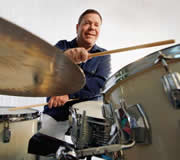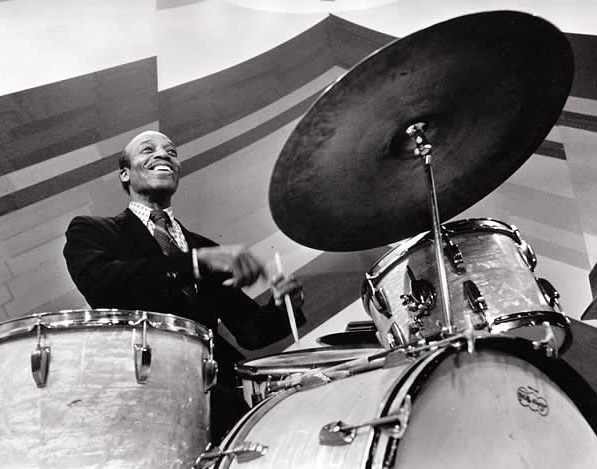ELVIS PRESLEY: LEAVING THE BUILDING 35 YEARS AGO
Thursday, August 16th, 2012[Excerpted from the book, “My Life in Showbiz and All that Jazz” by Bruce H. Klauber]
My earliest musical memory? Elvis Presley. I was four years old when I used to curl up for hours by a heating vent in our row home, playing “Hound Dog” over and over again on a record player that only played 45rpm platters. I so annoyed my family that my mother finally hid the recording.
I had never heard anything like the fire that Elvis had. Though he had appeared on television programs hosted by Milton Berle, Steve Allen and Tommy and Jimmy Dorsey, it was on the top-rated “Ed Sullivan Show” that The Pelvis made his biggest splash. Watching Sullivan was a Sunday night tradition in our family, and many other families, and I eagerly anticipated seeing Elvis in action. The man was incredible, and I think I saw his first movie, “Love Me Tender,” a dozen times. In the years to follow, I saw every picture Elvis ever made, as lousy as the majority of them were. I was listening to the car radio in the summer of 1977 when the news of his death was broadcast. I still haven’t gotten over it.
Years later, I was driving home from my suburban Philadelphia office. It was in the fall and the sun was beginning to go down at around 6 p.m. All of a sudden, in the middle of the street, I saw Elvis Presley, in full Elvis regalia. Maybe all the talk was true. Maybe Elvis wasn’t really dead. I pulled the car over, began talking to him, and invited him to the jam session I was co-hosting that night in center city Philadelphia. “It’ll be cool, man,” I told Elvis. “No publicity. Come down and do a couple of tunes.”
“Maybe I will,” he said. “And thank you very much.”
Arriving home, I was white as a sheet. “Elvis” never showed up at the jam, and everyone I ever told about that scenario thought I was crazy. Six months later, I was telling a neighbor this story and found out there was a mentally challenged man who lived in the Roxborough section of Philadelphia, where I was then living, who walked the streets dressed as—and impersonating—Elvis. I guess the real Presley is dead after all. Then again, who knows?
I’ve written extensively about Elvis through the years, with a concentration on those despicable, “tell all” books that proliferated after his death. The late author Albert Goldman, who also crucified Lenny Bruce in print, was one of the more guilty parties. I won’t deny I was curious. Those who loved Elvis often wondered why he made those terrible films, recorded even more terrible soundtracks to many of his pictures, never toured Europe, rarely challenged himself as an artist, and in the end, killed himself.
Musically, he synthesized elements of blues, and the sounds of early rock pioneers such as Louis Prima and Louis Jordan. What he did was authentic and listeners could tell he “felt it.” He was also a naive country boy who, early on, put his entire livelihood in the hands of a self-serving lout named Colonel Tom Parker, an illegal alien and gambling addict who once managed country singers Eddy Arnold and Hank Williams. Parker could never see beyond a dollar sign. For years, Parker talked of writing his autobiography, which he was going to title, “How Much Does it Cost if it’s Free?”
But the Colonel wasn’t an idiot. When Elvis’ stock began to rise, he was concerned about Presley’s rep as a rebel and one who was single-handedly inspiring juvenile delinquency. He needed to institute damage control, which is why he literally forced his client to go into the army, and later, attempted to transform him into another Crosby via all those non-threatening films. Who could be more white bread than Crosby? (If only the public knew then what the real Crosby was like.)
The strategy of The Colonel worked, but in the process, irrevocably damaged Presley’s stature as a musical artist and motion picture star. There was hope for him, when the Pelvis starred in his comeback television special of 1968, but then The Colonel took the traditional route by booking him often in Vegas, and in stadiums through out the country, many of them in the non-demanding hinterlands. In retrospect, simply because The Colonel was an illegal alien and had no passport, it is impossible to conceive that Elvis Presley never gave a live performance outside of the United States. And there would be no tampering with Presley image, either, which is why Parker vetoed what may have been transforming film projects for “his boy,” including a co-starring role with Barbra Steisand in “A Star is Born.”
Elvis Presley died, I maintain, because of frustration and bitterness and because he knew his true potential was not even partially realized.






